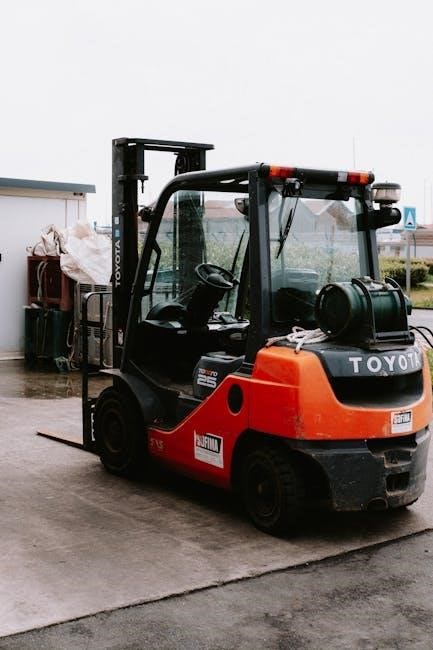nj commercial drivers license manual
Welcome to the New Jersey Commercial Driver License (CDL) Manual, your guide to obtaining and maintaining a CDL in NJ․ This manual provides essential information on federal and state regulations, safe driving practices, and legal requirements for commercial drivers․ It is designed to help you prepare for CDL exams and ensure compliance with traffic laws․ Reading this manual thoroughly is crucial for understanding the responsibilities and expectations of commercial drivers in New Jersey․

Eligibility Criteria for Obtaining a NJ CDL
To qualify for a New Jersey CDL, applicants must be at least 21 years old, provide proof of residency, and hold a valid medical certificate․ They must pass vision and knowledge tests, complete a background check, and meet federal and state requirements․
2․1․ Age Requirements
In New Jersey, you must be at least 21 years old to apply for a CDL for interstate commerce․ For intrastate driving, the minimum age is 18․ However, some employers or insurers may require drivers to be older․ Applicants under 21 cannot operate hazardous materials (HAZMAT) vehicles or passenger vehicles with 16 or more passengers․ Meeting the age requirement is a critical step in the CDL application process․
2․2․ Residency and Documentation
To apply for a NJ CDL, you must provide proof of residency and identity․ Accepted documents include a valid NJ driver’s license, utility bills, or lease agreements for residency․ For identity, a Social Security card, birth certificate, or passport is required․ All documents must be valid and unexpired․ Non-citizens must provide proof of legal status․ Ensure all paperwork is complete to avoid delays in the application process․ Check the NJ MVC website for specific requirements․

Types of CDL Licenses in New Jersey
New Jersey offers three classes of CDLs: Class A, B, and C, based on vehicle weight and type․ Each class requires specific qualifications and training․
3․1․ Class A, B, and C Licenses
In New Jersey, CDLs are classified into three types: Class A, B, and C․ Class A allows operation of vehicles with a GVWR of 26,001 lbs or more, pulling trailers․ Class B covers heavy straight trucks and buses․ Class C is for smaller passenger vehicles or hazardous material transport․ Each class requires specific endorsements and training, ensuring drivers are qualified for their vehicle type and cargo․
3․2․ Endorsements and Restrictions
Endorsements and restrictions on a NJ CDL determine the types of vehicles and cargo a driver can operate․ Common endorsements include H (hazardous materials), N (tank vehicles), and T (double/triple trailers)․ Restrictions, such as L (no air brakes) or E (no manual transmission), limit driving privileges․ Applicants must pass additional tests for endorsements and adhere to restrictions based on their qualifications and vehicle requirements․ These designations ensure safe and compliant commercial driving practices in New Jersey․

The CDL Application Process in NJ
The CDL application process in NJ involves submitting required documents, paying fees, and completing necessary tests․ The manual guides you through eligibility, forms, and procedures․
4․1․ Steps to Apply
To apply for a CDL in NJ, complete the application form and submit required documents, including proof of residency, identity, and medical certification․ Pass a vision test, pay the applicable fees, and schedule a knowledge test․ Upon passing, obtain a learner’s permit and prepare for the skills test․ The manual outlines each step in detail to ensure a smooth process․
4․2․ Fees and Requirements
Fees for a NJ CDL vary by license class and endorsements․ Applicants must pay for the application, knowledge test, and skills test․ Additional costs include medical certification and potential endorsements․ Requirements include passing vision and knowledge tests, completing a medical exam, and providing proof of residency and identity․ The manual details all associated fees and necessary documentation to ensure compliance with state and federal regulations․
Preparing for the CDL Written Test
Prepare for the NJ CDL written test by studying the manual, focusing on safe driving practices, traffic laws, and signs․ Utilize online practice tests to assess readiness and identify areas for improvement․ Thorough review ensures a strong foundation for passing the exam and obtaining your CDL․
5․1․ Study Materials
The NJ CDL manual is the primary study resource, covering state-specific rules, safety protocols, and federal regulations․ Online practice tests provide hands-on experience with exam formats․ Additional materials include driving handbooks, training guides, and video tutorials․ Focus on sections like air brakes, combination vehicles, and hazmat handling․ Utilize flashcards to memorize key terms and concepts․ Leverage free online resources to reinforce learning and ensure thorough preparation for the written test․
5․2․ Practice Tests
Practice tests are essential for assessing readiness for the CDL written exam․ Utilize online resources offering free CDL practice tests, such as general knowledge, combination vehicles, and air brakes․ These tests simulate real exam formats, helping build confidence and familiarity․ Focus on understanding incorrect answers to improve knowledge gaps․ Regular practice ensures mastery of key concepts and boosts performance on the actual test day․

Understanding the CDL Skills Test
The CDL skills test evaluates your ability to operate a commercial vehicle safely․ It includes a pre-trip inspection, basic vehicle control exercises, and an on-road driving test․
6․1․ Pre-Trip Inspection
The pre-trip inspection is a critical component of the CDL skills test, ensuring the vehicle is safe to operate․ Drivers must check tires, brakes, lights, mirrors, and hydraulic systems․ This step verifies all components are functioning properly, reducing the risk of accidents․ The inspection demonstrates the driver’s ability to identify potential issues before driving․ It is a mandatory part of the testing process and a key aspect of responsible commercial driving practices in New Jersey․
6․2․ Driving Test
The CDL driving test evaluates your ability to operate a commercial vehicle safely and effectively․ It assesses basic driving skills, such as starting and stopping, turning, and backing up․ You will also demonstrate how to navigate intersections, maintain lane positioning, and handle various traffic scenarios․ The test is conducted in real-world conditions to ensure you can manage the vehicle confidently and responsibly․ Safe and precise driving techniques are essential to pass this critical step in obtaining your CDL․

Safe Driving Practices for Commercial Vehicles
Safe driving practices are critical for commercial vehicle operators․ Maintain a safe following distance, regularly check mirrors, and be aware of surroundings․ Always use signals and avoid distractions while driving․ Proper handling of emergencies, such as brake failures, is essential․ Regular pre-trip and post-trip inspections ensure vehicle safety․ Adhering to traffic laws and regulations is vital for protecting yourself and others on the road․
7․1․ Pre-Trip and Post-Trip Inspections
Pre-trip inspections ensure your vehicle is roadworthy․ Check tires, brakes, lights, and fluid levels․ Post-trip inspections verify all systems are functioning properly after driving․ Regular inspections help prevent mechanical failures and ensure safety․ They also comply with federal and state regulations․ Always document findings to maintain accountability․ These practices are essential for protecting yourself, passengers, and other road users․ Consistency in inspections promotes a culture of safety and responsibility․
7․2․ Sharing the Road
Sharing the road safely is critical for commercial drivers․ Always be aware of your surroundings and maintain a safe distance from other vehicles․ Use mirrors and check blind spots frequently․ Be cautious around smaller vehicles and pedestrians, as they may behave unpredictably․Signal clearly before changing lanes or turning․ Avoid aggressive driving and never tailgate․ Respecting other road users ensures a safer environment for everyone․ Defensive driving is key to preventing accidents and complying with traffic laws in New Jersey․

Traffic Laws and Regulations for CDL Holders
CDL holders must adhere to strict traffic laws and regulations in New Jersey, including hours of service, weight limits, and safe driving practices․ Compliance is essential for road safety and legal requirements, ensuring the well-being of all road users and upholding professional driving standards․
8․1․ Hours of Service
Hours of Service (HOS) regulations are critical for CDL holders in New Jersey․ Drivers must not exceed 11 hours of driving time within a 14-hour workday․ A mandatory 30-minute break is required after 8 hours of driving․ These rules ensure driver safety and reduce fatigue-related accidents․ ELDs (Electronic Logging Devices) are used to monitor compliance․ Violations can result in fines and license suspension, emphasizing the importance of adhering to these guidelines for road safety and legal compliance․
8․2․ Weight and Size Restrictions
Commercial vehicles in New Jersey must adhere to strict weight and size limits․ The maximum gross vehicle weight is 80,000 pounds, with axle limits enforced to prevent damage to roads․ Vehicle lengths, widths, and heights are also regulated․ Drivers must obtain special permits for oversized or overweight loads, ensuring safe transport․ Compliance with these restrictions is essential to avoid fines and maintain road safety․

Medical Requirements for CDL Holders
CDL holders must meet specific medical requirements to ensure public safety․ Regular exams and certification are mandatory․ Maintaining good health and vision is crucial for compliance․
9․1․ Medical Certification
Medical certification is a critical requirement for CDL holders in New Jersey․ Drivers must undergo regular medical exams conducted by a certified medical examiner․ The exam ensures compliance with federal health standards, including vision, blood pressure, and physical ability to operate a commercial vehicle safely․ Certification must be renewed periodically, and failure to maintain it can result in loss of CDL privileges․ A valid medical card is essential for legal operation of commercial vehicles․
9․2․ Maintaining Medical Eligibility
Maintaining medical eligibility is essential for CDL holders in New Jersey․ Drivers must undergo periodic medical exams to ensure ongoing compliance with federal health standards․ Any significant health changes must be reported to the New Jersey Motor Vehicle Commission․ Failure to maintain medical certification can result in CDL suspension․ Regular check-ups with a certified medical examiner are required to keep your CDL active and valid․ Stay updated on medical requirements to avoid losing your privileges․

The Role of the CDL Manual in Training
The NJ CDL Manual is a vital training resource, offering detailed guidance on federal and state regulations, safe driving practices, and exam preparation․ It serves as the primary study material for commercial drivers, ensuring they understand their responsibilities and legal obligations․ While formal training enhances practical skills, the manual remains the cornerstone of theoretical knowledge for obtaining and maintaining a CDL․
10․1․ Key Sections of the Manual
The NJ CDL Manual includes essential sections like safe driving practices, pre-trip inspections, and traffic laws․ These sections provide detailed guidance on federal and state regulations, ensuring drivers understand their legal and safety responsibilities․ The manual also covers endorsements, restrictions, and medical requirements, making it a comprehensive resource for both new and experienced commercial drivers․ It is a critical tool for exam preparation and ongoing professional development․
10․2․ Manual vs․ Formal Training
The NJ CDL Manual serves as a self-study guide, providing foundational knowledge for commercial drivers․ While it covers essential topics like regulations and safe practices, formal training offers hands-on experience and structured instruction․ Training schools provide expert guidance, practical skills, and real-world insights, making them more comprehensive than manual study alone․ Both resources are valuable, but formal training is often more effective for mastering complex driving skills and preparing for real-world scenarios․

Additional Resources for CDL Applicants
Explore online practice tests, training schools, and official resources to complement your manual study․ These tools enhance preparation and provide hands-on experience for CDL success in NJ․
11․1․ Online Practice Tests
Utilize free online CDL practice tests to assess your knowledge and readiness․ These tests cover essential topics like General Knowledge, Combination Vehicles, and Air Brakes, simulating real exam questions․ They help identify weak areas, allowing focused study․ Many resources offer scoring systems and detailed explanations to enhance understanding․ Regular practice ensures familiarity with exam formats and boosts confidence․ Additionally, online platforms provide flexibility, enabling you to study at your own pace and track progress effectively․
11․2․ Training Schools in NJ
Enroll in a reputable CDL training school in New Jersey for expert instruction and hands-on experience․ These schools provide comprehensive programs covering both theoretical and practical aspects of commercial driving․ Many offer state-of-the-art facilities and certified instructors to ensure you master the skills needed for your CDL exams․ Training schools also help you understand federal and state regulations, ensuring you are well-prepared for a successful career in trucking․ Formal training is highly recommended for first-time applicants․

